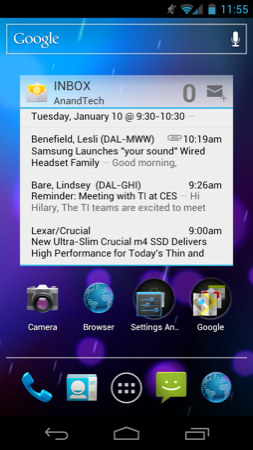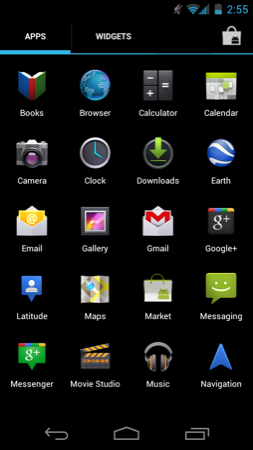Samsung Galaxy Nexus & Ice Cream Sandwich Review
by Brian Klug & Anand Lal Shimpi on January 18, 2012 1:34 PM ESTGoogle employs more than 20,000 people worldwide and the number of them working on Android are in the single digit percentage range. Google's business is search, but it has always had aspirations of more. Android isn't just a chance to capitalize on mobile search for Google, it's also an opportunity to grab power in the next era of personal computing. If you believe that smartphones will eventually replace mainstream PCs, who wouldn't want to be to smartphones what Microsoft was to PCs in the early 1990s?
Previous versions of Android have been cautious, evolutionary steps along a path to being a more open/flexible alternative to iOS. Starting with Honeycomb (Android 3.0) however, Google began to step out of the shadow of its competitors and really start to define Android as a mobile computing platform. Honeycomb was limited to tablets but its successor, Ice Cream Sandwich (Android 4.0), would bring unification to Android across both tablets and smartphones.
Today we look at both ICS and its launch vehicle, Google's Galaxy Nexus.
The Android vs. iOS Debate
It's very clear to me now more than ever that Apple and Google have completely different goals with their mobile OS strategies. Excluding the unclear strategy behind Chrome OS, Android is pretty much Google's primary operating system. The unified tablet/smartphone strategy behind Ice Cream Sandwich makes sense because for Google to succeed in the OS business it needs to deploy Android on everything from smartphones to notebooks. We've already seen the strengths in having a smartphone platform with a strong app ecosystem. Things become even more appealing if you have a phone, tablet and PC that all run the same OS and apps. As Android is Google's one-size-fits-all operating system, it needs to have a broader and slightly more ambitious focus than iOS otherwise it risks losing the race in the long run.
Apple is in a different position. It already has a successful desktop/notebook OS that is continuing to grow. While iOS has been a runaway success for Apple, the Mac OS X platform is a solid option for any user who needs more than their iPhone or iPad can provide. The two OSes may converge or at least borrow heavily from one another, but in the interim they can remain independent. If you need more of a computing experience Apple is happy to sell you a Mac. If you want the it-just-works appliance experience in your phone or tablet, Apple has a whole bunch of iPhone/iPad configurations to offer you.


ICS isn't a step towards iOS. If anything it proves that Google is committed to its own trajectory. Android is an OS that, although more closed than many would like, still allows more flexibility than iOS. You can sideload apps not purchased in the Market. The file system isn't completely hidden from you. You can even override the default zoom level on web pages. Apple and Google both pour tons of time and research into figuring out the best way to do something. And, to be honest, I feel like Apple generally does a better job of "getting it" for the very mainstream consumer. Rather than attempt to make the perfect mold however, Google gives you one that's a bit more flexible.
I've said this before but I do believe that Apple is trying to deliver more of an appliance experience, whereas Google is providing you with a modern take on a traditional computing experience. If the appliance is a smartphone, then both approaches are equally capable - it's just a matter of personal preference.
What's new in ICS really falls into one of three categories:
- Improvements in UI frame rate due to OpenGL ES rendering (non-skia) path
- UI tweaks
- New features
Nowhere in this list is a fundamental change in the way Android works. I feel that this is a very important point to understand and likely the cause for lots of disagreement when it comes to just how impressive (or not) ICS is.
ICS is smoother, more polished and has its own set of new features that make it a significant step forward for Android. What ICS is not however is an outright clone of iOS. If you prefer the iOS experience to Android, ICS will do nothing to change your opinion. If all you were missing from Android was a smoother UI, then its fourth major release should be almost everything you could ask for.










185 Comments
View All Comments
CoryS - Thursday, January 19, 2012 - link
Guys, this is a NEXUS it is a dev device. That primary reason I got it was because of this...better hardware will be right around the corner...but we won't see another Nexus..especially on Verizon for some time.It is refreshing to have a community to fix issues OEMS ignore (yes even Apple) for a change. This is my first unlocked device, and i can't see myself ever going back to anything else.
medi01 - Friday, January 20, 2012 - link
Wake up, Smartphone market (worldwide):1. Samsung 24%
2. Apple 18%
Android vs Apple = 3 vs 1 and gap is raising.
Most people turn to apple due to FUD, like this article. Google "steppit out of the shade of its competitor" having three times Apple's market share and much more usable interface (try to quickly access settings like wlan/bluetooth/gps on ios)
steven75 - Friday, February 10, 2012 - link
LOL dont you get it? You don't *need* to fiddle with those settings on iOS necause the battery life is so dramatically better.Also, funny reading this comment after Apple's Q4 report where they dominated.
Omid.M - Wednesday, January 18, 2012 - link
I hope Samsung puts out this phone based on GN aesthetics but Exynos 5250 (plus MDM9xxx multi-mode/LTE modem) and blows away the competition.@moids
Chumster - Wednesday, January 18, 2012 - link
Could someone clarify on what GPU/CPU he was talking about coming in Q2 devices? Cray? Crate? It was hard to pick up on my headphones.mmp121 - Wednesday, January 18, 2012 - link
KraitRead below:
http://www.anandtech.com/show/4170/qualcomms-annou...
Enjoy!
Conficio - Wednesday, January 18, 2012 - link
Really, Google can't survive once Walled Garden platforms like iOS gain traction.While it is nice to control the OS (Chrome OS) on PC like devices and nice to stick it to Microsoft, it is essential in the world of smart phones. Google clearly saw that Apple did the unthinkable, wrestle control of the phone's apps away from the networks. That is an existential thread for Google. If there is a billion PC users world wide, there is a multitude of smart phone users, sooner or later.
If a hardware manufacturer and OS provider like Apple (or Microsoft) controls the apps that can be provided to the phone and features, move from browser to apps on phones, then this is the end of (a profitable) google sooner or later.
From anther point of view, Google is a huge data center that provides you with data services on their computing power (and you pay for it with advertisement somehow). Apple is a hardware manufacturer that sees it necessary to control the software to deliver a good user experience. Sure, two different approaches to a smart phone OS.
hackbod - Tuesday, January 24, 2012 - link
"Google clearly saw that Apple did the unthinkable, wrestle control of the phone's apps away from the networks."There is this weird thing I see expressed a lot, as if Android is a reaction to the iPhone.
It is not.
In this particular case, it is obvious: Android's SDK was made available a few months after the original iPhone was on sale, well before there was *any* native SDK for the iPhone. At that time Apple's very clear official policy was that web-based apps was the One True Way to create applications for their phone. There was no concept of an App Store, no phone apps except what Apple shipped built in to the iPhone, nothing wrestled away from the networks in that department.
If Android was a reaction to anything, it was to the current situation on desktop PCs, with one company controlling that platform, and being able to quite strongly dictate and control its ecosystem and thus large parts of the computer industry.
One of the goals of Android was to try to keep that from happening in the upcoming mobile industry, by creating an open platform so that everybody in the industry can compete as equally as possible.
(And an aside -- this also makes it funny to see the recent stuff going around about Google "losing control" of Android. Android was very much set up so that no one company, not even Google, could have anything like the control that Microsoft does over Windows. This should be pretty obvious to anyone who wants to actually write thoughtful articles on the topic and not just link bait.)
bjacobson - Wednesday, January 18, 2012 - link
Can you talk more about this? From Diane Hackborne's post here (https://plus.google.com/u/0/105051985738280261832/... it sounds like the "limitation" is memory bandwidth in that hardwares that are "laggy" are laggy because they can't render to the entire screen 2 and 3x per frame for all the overlays. Which wouldn't seem like so much of a Tegra2 limitation in my opinion considering it has the power to play games like Quake 3 at 1600x1200 @ 60fps (I think...right?). What are your thoughts?hackbod - Tuesday, January 24, 2012 - link
I don't know about the performance of Tegra 2 playing Quake, but you need to be very careful when comparing the traditional 3d workload that GPUs are highly optimized to support (as exemplified by Quake) vs. the performance rendering 2d graphics.Traditional 3d games tend to rely, for example, on triangle rendering as much if not more than raw pixel fill rate, and GPUs are designed to be able to do that fast. When drawing 2d scenes, there are very few triangles but those triangles cover very large parts of the screen and are rendered as overlapping layers.
On all of the hardware I have seen, for 2d rendering raw memory bandwidth (determining the number of times every pixel can be touched per frame) is the #1 impact on performance.
Look back at that post -- for a typical scroll of all apps in launcher, without using overlay tricks (which aren't available on Tegra when the screen is rotated), you are looking at touching every pixels about 4 times to render all the layers and composite them to the screen. This is just not a typical 3D game workload.